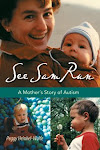Until he became a teenager and adult, however, it was never very clear to me what friendships meant to Sam. They seemed to matter, but the attachments weren't quite like the attachments his brother and sister developed with their friends. Sam was fortunate in that the elementary school counselor fostered friendships that ended up carrying Sam through much of his middle and high school years. I saw, over time, that friendships have always been important to Sam. He adores his friends.
On his Facebook page, I've seen many of the same names from those early circles, plus a lot of new names. He enjoys being on Facebook and feeling connected to people.
But in daily life, the social activities -- movies, bowling, games -- have really dropped off since high school. Many of his high school chums are graduating college and getting on with adult things -- getting jobs, apartments, moving away. I know that is as it should be.
Since Sam is a student at a community college and not a traditional, four-year school, his opportunities for a rich social life are limited. He takes advantage of many that TRIO offers, but that's about it.
Adult life brings new circles of people, and new possibilities of friendships. He has a devoted circle of friends at Riding Unlimited, and a small circle of friends from our community. A co-worker invited him to come along to the Denton Arts & Jazz Festival, an invitation Sam had to turn down because of a school conflict. Sometimes they go to lunch together.
Humans are not lone creatures like hawks, or eagles, or foxes, or polar bears. We're more like goats, or sheep, or horses -- we're herd animals. We need connections to survive, and to thrive.
As adults, making connections -- well, we're not very imaginative about it. We befriend people like us. After you get married, for example, you make friends with other couples. After you have a baby, all your new friends are other couples with babies. Friendships with people who aren't exactly like us take a little more thought and consideration.
I know there are support groups that could help Sam and others like him make friends, expanding their social life. We've been to a few. But, they are so far removed from his daily life, they might as well be in Katmandu. In my dream world, everyone meets someone like Sam at some point in their life and decides this person is someone to include in their circle of friends.
In the final analysis, it only requires a little imagination, it's not difficult at all to be Sam's friend.






No comments:
Post a Comment